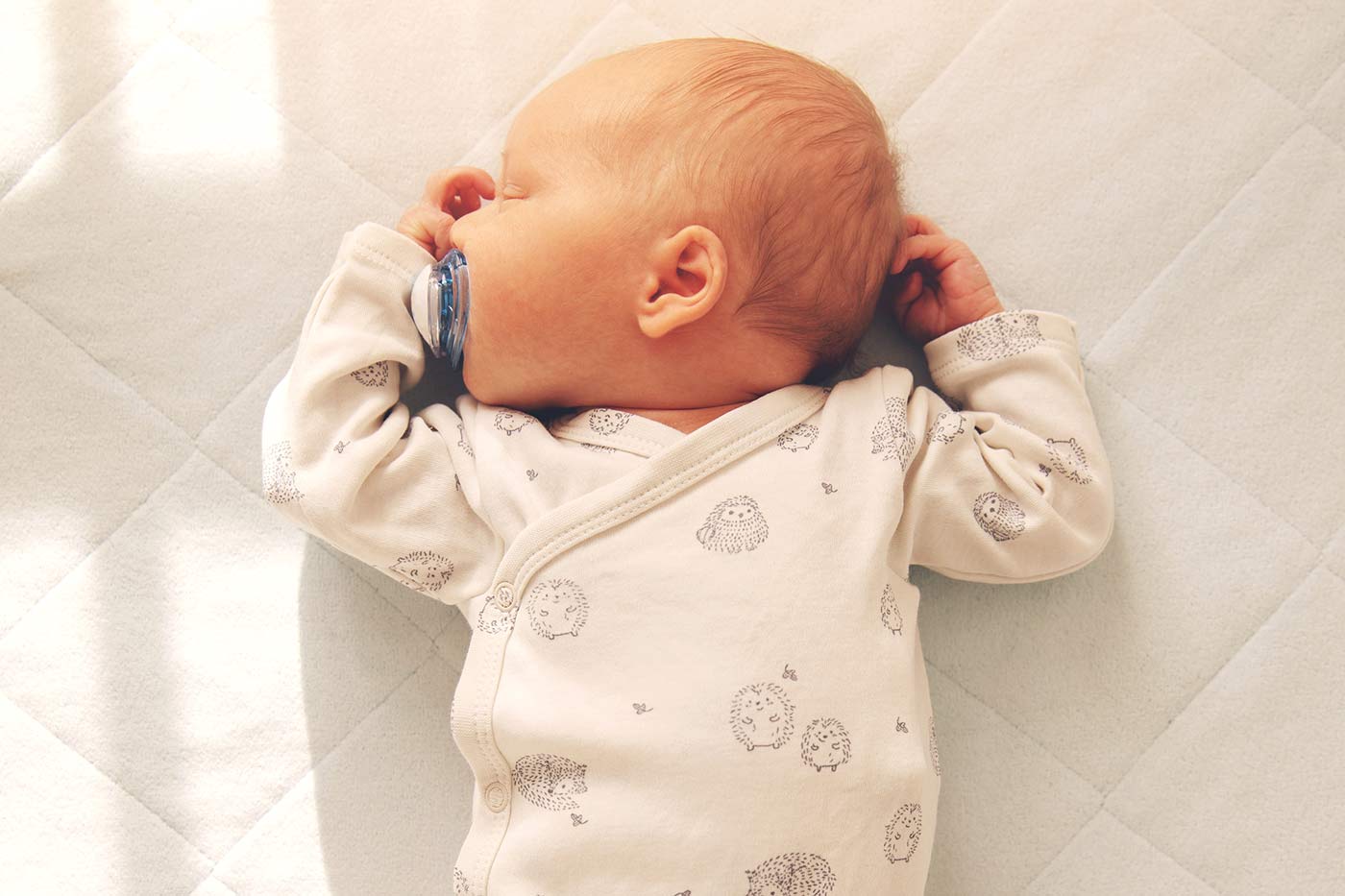How to Get Your Baby to Nap Longer than 30 Minutes
Struggling with your newborn suddenly taking short naps? Learn how to get your baby to nap longer than 30 minutes and get the sleep you need!
 I can remember one instance when my newborn son slept for five hours straight during the day. With all those hours to myself, I had folded the laundry and prepared our meals and still had time to spare. I kept checking in on him to see if this was a fluke, or whether he was really sleeping.
I can remember one instance when my newborn son slept for five hours straight during the day. With all those hours to myself, I had folded the laundry and prepared our meals and still had time to spare. I kept checking in on him to see if this was a fluke, or whether he was really sleeping.
You see, this was such an anomaly because, more often than not, I couldn’t get him to nap past 30 minutes. In fact, 45 minutes was considered a “long” nap for him. His nighttime sleep was better, but his naps were terribly short.
I also knew he was overtired but had no idea what to do to get him to take a longer nap.
To be clear, we can’t expect newborns to take long naps with consistency. But when you’re only getting 30-minute naps all the time, this can certainly make life more challenging.
My babies didn’t sleep through the night until well past the newborn stage after sleep training. That said, I learned a few tricks to help them sleep during the day until then. Take a look at the tips that worked, and I hope they can work for you, too:
Table of Contents
1. Shorten your baby’s wake times
Many of us assume that babies will simply fall asleep when they’re tired enough, regardless of when and where. Unfortunately, that’s rarely the case. They usually need our help in some way to fall asleep.
The first step is to assume that your baby will need his nap sooner than later. One way to do so is to watch for sleep cues—the second he fusses and yawns, start your nap routine.
Another is to simply watch the clock. Don’t let him go past 90 minutes of being awake before putting him down for another nap. Let’s say he tends to fuss after an hour. If he woke up at 9am, put him down for the next nap by 10am.
The longer you wait to put him down, the fussier he’ll likely get.
Free resource: Want to learn more about how his awake time might be affecting how well he sleeps or not? Join my newsletter and get One Mistake You’re Making with Your Baby’s Awake Time—at no cost to you.
Don’t make the same mistakes I did—help him fall asleep with this one simple trick! Grab it below:
2. Change your baby’s environment
Disclosure: This article contains affiliate links. As an Amazon Associate, I earn from qualifying purchases.
Silence isn’t always golden when it comes to your baby’s sleep environment. In fact, it allows even the slightest sound—a creaking door, footsteps along the hallway—to wake her up.
Instead, use white noise to muffle sounds that could startle her awake. A sound machine works, but a simple fan, heater, or even an app can do just as well. The white noise can help her sleep longer, and you won’t feel like every sound you make might wake her up.
Blackout curtains in her room can also extend the nap even more. With a dark room, she won’t have to contend with light peeking through and waking her up.
And if you truly can’t get her nap, use motion to help her fall asleep. The lulling motion of a swing can buy you some extra time than if she were simply in her crib.
3. Swaddle your baby
Wrapping your baby in a snug swaddle can help her sleep in a few ways. To start, the tightness resembles the sleeping position she had grown accustomed to in your womb. After all, she had been sleeping in this position for months, not lying flat on her back.
Second, a swaddle prevents her from flailing her arms from the Moro reflex babies are born with. Rather than slapping herself awake, her arms remain snug by her sides.
A swaddle was a must with all my kids, as they took longer naps when they were swaddled more than the times they weren’t. To save on time, use a pre-made swaddle like this one rather than a blanket that can easily come undone.
4. Put your baby down drowsy but awake
Do you hold your baby to sleep, only for her to wake up in the crib a few minutes later? Part of the problem is that she had fallen asleep in your arms and feels disoriented when she finds herself awake elsewhere.
She has also grown used to falling asleep in a certain way—in your arms, as in our example. If that’s the only way she knows to fall asleep, then she won’t know how to put herself back to sleep when she wakes up mid-nap.
To help her get used to new habits of falling asleep on her own, put her down drowsy but still slightly awake. She’ll be in the mood to fall asleep, but can start practicing how to put herself to sleep in the place where she’ll eventually nap.
5. Don’t end naps when your baby cries
The next time your baby wakes up crying mid-nap, don’t end nap time just yet. When you pick him up to sleep in your arms or end nap time when he cries, he starts to expect these very behaviors each time.
Instead, help him fall back asleep without having to rock or feed him. See if he’ll take a pacifier, especially if you catch him as he’s starting to wake up. Rock him in the bassinet, pat his tummy, or rub your hand through his hair.
Pick him up to calm him down if needed, but again, put him down drowsy but still awake so he doesn’t fall asleep in your arms. This teaches him that he’ll stay in the room until nap time is officially over, and that you won’t turn on the lights or engage with him just yet.
Conclusion
It’s never easy when your newborn only naps for 30 minutes at a time or is suddenly taking short naps. Thankfully, you can try a few tricks to turn things around.
For instance, don’t keep her awake too long. Use white noise in her room to muffle sounds that can startle her. Keep her swaddled so she can sleep in a familiar position (and prevent the Moro reflex from waking her up).
Put her down drowsy but still slightly awake so that she can experience and practice how to fall asleep on her own. And lastly, don’t end nap time when she cries. Soothe and comfort her, but don’t get her up until the “official” nap time is over.
Now she’ll be able to sleep for more than 30 minutes—and who knows, maybe even a five-hour stretch once in a while.
Get more tips:
- What to Do When Your 3 Month Old Won’t Nap
- 5 Ideas to Help Your Catnapping Baby Sleep Longer
- What to Do When Your Overtired Baby Keeps Waking Up
- 3 Month Old Suddenly Waking Every 2 Hours?
- Newborn Not Sleeping? Here Are 9 Tips That Can Help
Don’t forget: Join my newsletter and get One Mistake You’re Making with Your Baby’s Awake Time below—at no cost to you:



